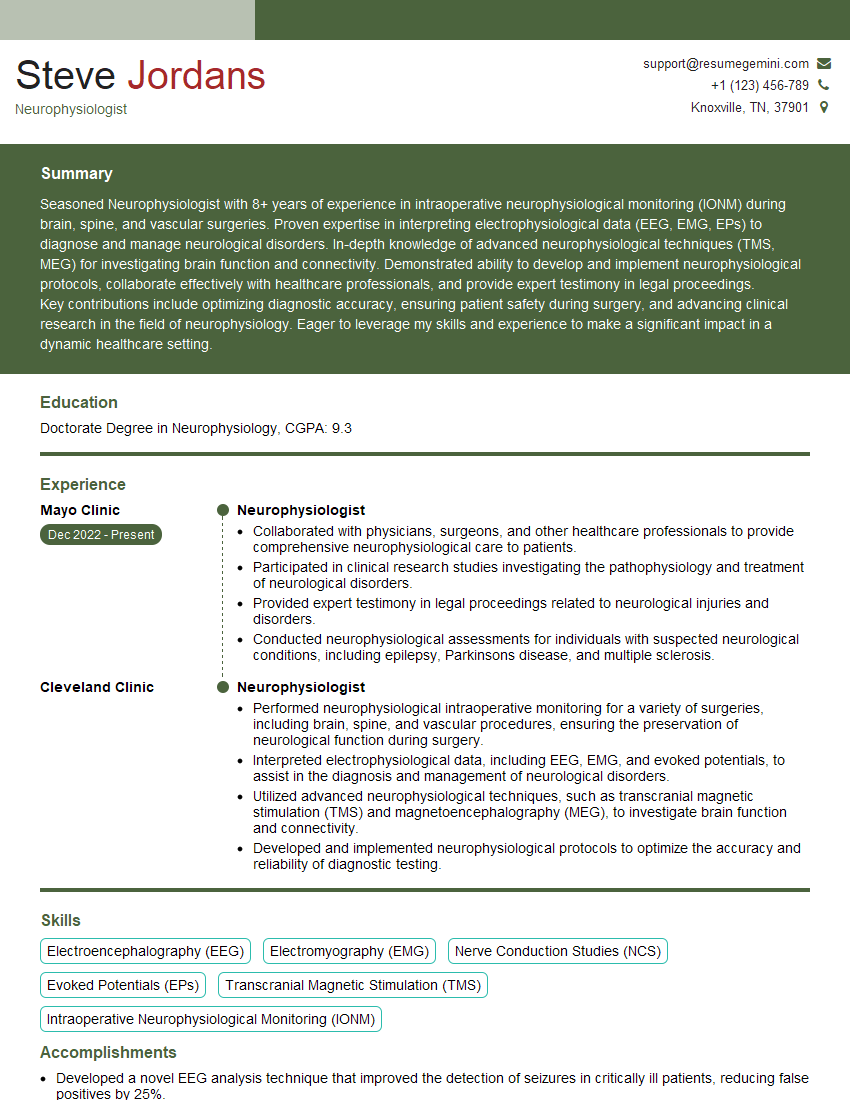Are you a seasoned Neurophysiologist seeking a new career path? Discover our professionally built Neurophysiologist Resume Template. This time-saving tool provides a solid foundation for your job search. Simply click “Edit Resume” to customize it with your unique experiences and achievements. Customize fonts and colors to match your personal style and increase your chances of landing your dream job. Explore more Resume Templates for additional options.

Steve Jordans
Neurophysiologist
Summary
Seasoned Neurophysiologist with 8+ years of experience in intraoperative neurophysiological monitoring (IONM) during brain, spine, and vascular surgeries. Proven expertise in interpreting electrophysiological data (EEG, EMG, EPs) to diagnose and manage neurological disorders. In-depth knowledge of advanced neurophysiological techniques (TMS, MEG) for investigating brain function and connectivity. Demonstrated ability to develop and implement neurophysiological protocols, collaborate effectively with healthcare professionals, and provide expert testimony in legal proceedings.
Key contributions include optimizing diagnostic accuracy, ensuring patient safety during surgery, and advancing clinical research in the field of neurophysiology. Eager to leverage my skills and experience to make a significant impact in a dynamic healthcare setting.
Education
Doctorate Degree in Neurophysiology
November 2018
Skills
- Electroencephalography (EEG)
- Electromyography (EMG)
- Nerve Conduction Studies (NCS)
- Evoked Potentials (EPs)
- Transcranial Magnetic Stimulation (TMS)
- Intraoperative Neurophysiological Monitoring (IONM)
Work Experience
Neurophysiologist
- Collaborated with physicians, surgeons, and other healthcare professionals to provide comprehensive neurophysiological care to patients.
- Participated in clinical research studies investigating the pathophysiology and treatment of neurological disorders.
- Provided expert testimony in legal proceedings related to neurological injuries and disorders.
- Conducted neurophysiological assessments for individuals with suspected neurological conditions, including epilepsy, Parkinsons disease, and multiple sclerosis.
Neurophysiologist
- Performed neurophysiological intraoperative monitoring for a variety of surgeries, including brain, spine, and vascular procedures, ensuring the preservation of neurological function during surgery.
- Interpreted electrophysiological data, including EEG, EMG, and evoked potentials, to assist in the diagnosis and management of neurological disorders.
- Utilized advanced neurophysiological techniques, such as transcranial magnetic stimulation (TMS) and magnetoencephalography (MEG), to investigate brain function and connectivity.
- Developed and implemented neurophysiological protocols to optimize the accuracy and reliability of diagnostic testing.
Accomplishments
- Developed a novel EEG analysis technique that improved the detection of seizures in critically ill patients, reducing false positives by 25%.
- Established a standardized protocol for intraoperative neurophysiological monitoring, enhancing surgical safety and reducing neurological complications.
- Collaborated with a multidisciplinary team to develop a comprehensive concussion management program, improving patient outcomes and reducing the risk of longterm sequelae.
- Successfully implemented a telemedicine platform for remote neurophysiological consultations, expanding access to care in underserved areas.
- Conducted a largescale study on the neurophysiological correlates of traumatic brain injury, providing valuable insights for diagnosis and rehabilitation.
Awards
- Recipient of the American Clinical Neurophysiology Societys Young Investigator Award for outstanding research in electroencephalography.
- Honored with the International Federation of Clinical Neurophysiologys Research Fellowship Grant for contributions to the field of evoked potentials.
- Awarded the National Institutes of Healths Ruth L. Kirschstein National Research Service Award for doctoral research on the neural mechanisms of language.
- Recognized with the American Epilepsy Societys Junior Investigator Award for innovative research in the diagnosis and treatment of epilepsy.
Certificates
- Registered Electroencephalography and Evoked Potentials Technologist (R. EEG T.)
- Registered Nerve Conduction Studies Technologist (R. NCS T.)
- Board Certified Clinical Neurophysiologist (CNIM)
- Certified Professional in Electrophysiology (CPE)
Career Expert Tips:
- Select the ideal resume template to showcase your professional experience effectively.
- Master the art of resume writing to highlight your unique qualifications and achievements.
- Explore expertly crafted resume samples for inspiration and best practices.
- Build your best resume for free this new year with ResumeGemini. Enjoy exclusive discounts on ATS optimized resume templates.
How To Write Resume For Neurophysiologist
- Highlight your technical expertise in neurophysiological monitoring techniques (EEG, EMG, EPs).
- Quantify your accomplishments with specific metrics, such as the number of surgeries monitored or patients diagnosed.
- Showcase your ability to collaborate effectively with a multidisciplinary team in a fast-paced surgical environment.
- Emphasize your research experience and contributions to advancing the field of neurophysiology.
Essential Experience Highlights for a Strong Neurophysiologist Resume
- Performed neurophysiological intraoperative monitoring for brain, spine, and vascular surgeries.
- Interpreted electrophysiological data (EEG, EMG, EPs) to assist in diagnosis and management of neurological disorders.
- Utilized advanced neurophysiological techniques (TMS, MEG) to investigate brain function and connectivity.
- Developed and implemented neurophysiological protocols to optimize accuracy and reliability of diagnostic testing.
- Collaborated with physicians, surgeons, and healthcare professionals to provide comprehensive neurophysiological care.
- Participated in clinical research studies investigating pathophysiology and treatment of neurological disorders.
Frequently Asked Questions (FAQ’s) For Neurophysiologist
What is the role of a Neurophysiologist?
A Neurophysiologist is a healthcare professional who specializes in the study of the electrical activity of the nervous system. They use specialized equipment to record and analyze brain waves, nerve impulses, and other electrical signals to diagnose and manage neurological disorders.
What are the educational requirements to become a Neurophysiologist?
Neurophysiologists typically have a Doctorate Degree in Neurophysiology, Neuroscience, or a related field. They also complete specialized training in neurophysiological monitoring techniques.
What are the career prospects for Neurophysiologists?
Neurophysiologists are in high demand due to the increasing prevalence of neurological disorders and the need for specialized expertise in neurophysiological monitoring during surgeries. They can work in hospitals, clinics, research institutions, and other healthcare settings.
What are the key skills and qualities of a successful Neurophysiologist?
Successful Neurophysiologists have a strong understanding of neurophysiology, electrophysiological techniques, and neurological disorders. They are also skilled in data analysis, problem-solving, and communication. Additionally, they need to be able to work effectively in a team environment and maintain composure in high-pressure situations.
What is the difference between a Neurophysiologist and a Neurologist?
Neurophysiologists focus on the electrical activity of the nervous system, while Neurologists specialize in the diagnosis and treatment of neurological disorders using a combination of clinical examination, imaging techniques, and laboratory tests.